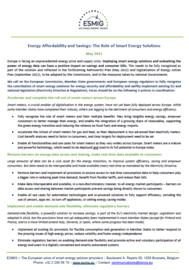Europe is facing an unprecedented energy price and supply crisis. Deploying smart energy solutions and unleashing the power of energy data can have a positive impact on savings and consumer bills. This needs to be fully recognised as part of the solution and reflected in the forthcoming RePowerEU Plan (May 2022) and Digitalisation of Energy Action Plan (September 2022), to be adopted by the Commission, and in the measures taken by national Governments.
We call on the European Commission, Member State governments and European energy regulators to fully recognise the contribution of smart energy solutions for energy security and affordability and swiftly implement existing EU and national legislation (Electricity Directive & Regulation). Focus should be on the following 3 actions in coordination:
1. Accelerate and complete the roll out of smart meters across Europe
Smart meters, a crucial enabler of digitalisation in the energy system, have not yet been fully deployed across Europe. While some Member States have completed their roll-outs, others are lagging to the detriment of consumers and energy efficiency.
- Fully recognise the role of smart meters and their multiple benefits: they bring tangible energy savings, empower consumers to better manage their energy, and enable the integration of a growing share of renewables, supporting the green energy transition and reducing the reliance on fossil fuels and energy imports.
- Accelerate the roll-out of smart meters for gas and heat, as their deployment is less advanced than electricity meters. Cost-benefit analyses need to factor in consumers, and clear targets for deployment need to be set.
- Enable all functionalities and use cases for smart meters as they vary widely across Europe. Smart meters are a mature and powerful technology, which needs to be deployed and used to its full potential in Europe today.
2. Remove barriers on energy data access and sharing, make real-time data available to consumers
Large amounts of data can be a core asset for the energy transition, to improve system efficiency, saving and empower consumers. But data needs to be interoperable and made available (near) real-time as mandated by the Electricity Directive.
- Remove barriers and implement all provisions to ensure access to real-time consumption data to help consumers play a bigger role in reducing peak time demand, benefit from flexible tariffs, and reduce their bills.
- Make data interoperable and available, in a non-discriminatory manner, to all energy market participants – barriers on data access and sharing between market participants prevent savings being directly shown to consumers.
- Enable all use cases for automation technologies and AI-powered solutions to fully support efficiency, including the use of sensors, apps etc. to turn off appliances, or setting energy saving modes.
3. Implement and enable demand-side flexibility, eliminate regulatory barriers
Demand-side flexibility, a powerful solution to increase savings, is part of the EU’s electricity market design. Legislation was adopted in 2019, but the provisions have not yet adequately been implemented in most Member States (except for Finland and France, and to a more limited extend Italy, Slovenia, or Spain, where some progress has been made).
- Implement all existing EU provisions for flexible consumption and generation in Member States to better respond to the pressing issues of high energy prices, reduce volatility and foster energy independence.
- Eliminate regulatory barriers on enabling demand-side flexibility and promote active and voluntary participation of all energy end-users in a digitally connected and smartly automated systems.
